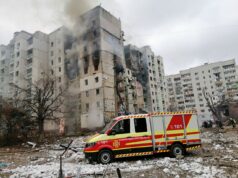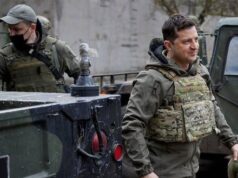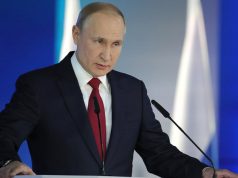

An unidentified device went off about 2:40 pm (1240 GMT) Monday in a subway carriage, as the train moved from the city’s Tekhnologichesky Institut Station to Sennaya Ploshchad Station, according to Russian news agency TASS.
Eleven people were killed, TASS reported, citing Russia’s National Anti-Terrorist Committee. Fifty-one people were injured, Russia’s Emergencies Ministry for St Petersburg confirmed.
Russian authorities announced a search for two people believed to have been involved in the bombing, according to Interfax news agency.
One suspect is believed to have placed a bomb under a seat on the train, which exploded while it was travelling between stations, while the other allegedly planted a bomb that was later disarmed at a nearby station.
The Russian Investigative Committee has qualified the blast as a terrorist attack, TASS reported, but other theories are being looked at by authorities.
“From the legal point of view, we cannot yet say it was a
terror attack,” Kremlin spokesman Dmitry Peskov said, according to TASS.
“Investigators will be able to say that after they consider all the theories,” he said. “Signs of a terrorist attack are obvious but there are certain investigation procedures.”
Earlier, the TASS news agency reported that a man and a young woman from Central Asia were possibly involved in the attack.
One of the two suspects is believed to be a 23-year-old man from Central Asia with Islamist ties.
Interfax also reported a theory being investigated “in which the bomb was worn by a suicide attacker.”
Footage from the scene showed shattered windows and train doors that had been ripped open by the blast. Security camera footage showed a suspect with a long beard and dark clothing.
Security was increased at transport hubs across the country in the wake of the attack.
All underground stations in St Petersburg were closed in the immediate aftermath of the blasts, although the network was partially reopened later. About 3 million people use the city’s underground every day.
President Vladimir Putin had been visiting St Petersburg for talks with Belarus President Alexander Lukashenko when the blast occurred.
He offered his condolences to the victims’ families, and convened a meeting with senior law enforcement officials to discuss the attack, state media reported.
Putin later went to the scene of the blast to lay flowers in memory of those killed. Condolences also arrived from leaders abroad.
Iran’s Foreign Minister Bahram Ghassemi called the attack “cowardly,” while US President Donald Trump phoned Putin to condemn the attack and to offer help in finding the perpetrators.
Trump “expressed his deepest condolences to the victims and their loved ones, and to the Russian people,” according to a White House statement following the conversation.
Trump also offered the “full support of the United States Government in responding to the attack and bringing those responsible to justice.”
Meanwhile, a spokesman for UN Secretary General Antonio Guterres said “those responsible for this appalling act must be held accountable.”
“I am shocked and saddened by the news of the attacks in the metro in St Petersburg … Nothing can justify such barbaric acts,” EU Commission President Jean-Claude Juncker said.
Trains have been the target of attacks in the past in Russia.
In 2010, a pair of suicide bombings on the Moscow underground, claimed by an Islamic separatist group, killed at least 40 people.
A year earlier, the same separatist group, Caucasus Emirate, claimed it was the perpetrator of a bombing of a high-speed train, en route from Moscow to St Petersburg, which killed at least 27 people.
-dpa










